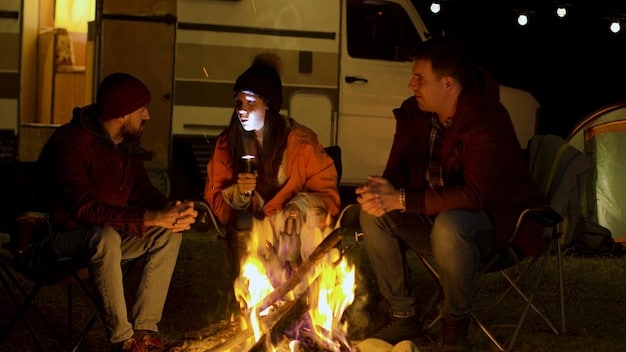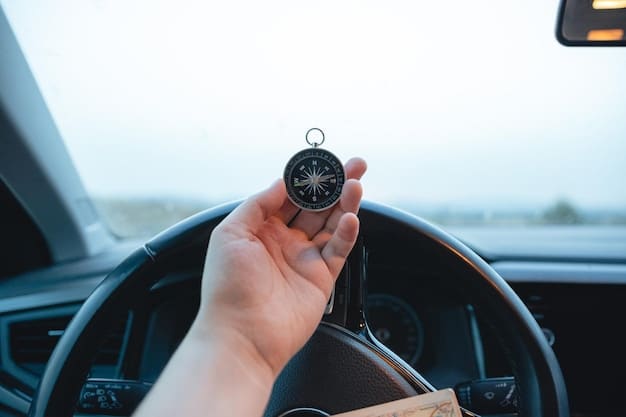Van Life in the US: Exploring Freedom and Challenges in 2025

Van life in the US in 2025 represents a cultural movement offering freedom and community, yet it also poses challenges such as financial sustainability and navigating legal restrictions for those embracing nomadic living.
The allure of the open road, minimalist living, and a strong sense of community has propelled van life in the US in 2025 into a significant cultural phenomenon. But what is the reality of this nomadic lifestyle, and what challenges do van dwellers face?
Understanding the Appeal of Van Life
Van life has captured the imagination of many seeking an alternative to traditional lifestyles. In 2025, its appeal continues to grow, driven by a desire for freedom, adventure, and a connection to nature.
But what exactly makes van life so attractive? Let’s dive into the core reasons behind its popularity:
The Pursuit of Freedom
At its heart, van life represents freedom – the freedom to travel, explore, and live life on your own terms. It’s about breaking free from the constraints of a fixed location and embracing the spontaneity of the open road.
Building a Sense of Community
Contrary to popular belief, van life isn’t always a solitary pursuit. A strong sense of community often forms among van dwellers, both online and offline. This community provides support, encouragement, and a shared sense of belonging.

- Financial flexibility: Van life can potentially lower living costs compared to renting or owning a home.
- Unique experiences: The opportunity to wake up to stunning landscapes and explore hidden gems is a major draw.
- Minimalist lifestyle: Downsizing and focusing on experiences over possessions can be incredibly liberating.
In conclusion, the draw of van life is multifaceted, driven by desires for autonomy and a closer knit community. As we delve into the realities, understanding these motivations helps to contextualize both the rewards and challenges of this lifestyle.
The Van Life Community in the US
The van life community in the US is diverse and vibrant, encompassing people from all walks of life. This community thrives on shared experiences, mutual support, and a common love for nomadic living.
Let’s explore some key aspects of this unique subculture:
Online Communities
Social media platforms and online forums are vital hubs for van dwellers to connect, share information, and offer advice. These online spaces often feature stories, photos, and tips relevant to van life. Connecting online can give you a sense of belonging and knowledge.
Offline Meetups and Gatherings
Organized meetups and gatherings provide opportunities for van lifers to connect in person, share experiences, and build lasting friendships. These events range from small, informal gatherings to large-scale festivals.

- Resource sharing: The community is known for sharing practical information, such as tips on free camping, van maintenance, and finding work on the road.
- Safety in numbers: Traveling with others can provide a sense of security and support, especially in remote areas.
- Inspiration and motivation: Seeing others embrace van life can inspire and motivate those who are just starting out.
The van life community is a powerful force that enriches the experience of nomadic living in the US. As van life continues to grow in popularity, this community will likely play an even more important role in shaping the culture and supporting its members.
Financial Realities of Van Life
While van life is often romanticized as a cost-effective way to live, it’s essential to consider the financial realities involved. Managing expenses, generating income, and planning for unexpected costs are crucial for long-term sustainability.
Let’s examine some key financial aspects of van life:
Initial Investment
The initial investment for van life can vary widely depending on the type of van, the extent of the conversion, and the quality of the materials used. Costs can range from a few thousand dollars for a basic conversion to tens of thousands for a luxury build.
Ongoing Expenses
Ongoing expenses for van life include fuel, maintenance, insurance, food, camping fees, and internet access. These costs can add up quickly, especially if you’re traveling frequently or relying on paid campsites.
Balancing income and expenses is key. With proper budgeting you can live the van life of your dreams:
- Remote work: Many van dwellers rely on remote work, such as freelance writing, web development, or online consulting, to generate income while on the road.
- Seasonal jobs: Others take on seasonal jobs, such as working at national parks or campgrounds, to supplement their income.
- Creative income streams: Some van lifers generate income through creative pursuits like photography, blogging, or selling handmade goods.
Ultimately, successful van life requires careful financial planning and a realistic understanding of the costs involved. By managing expenses, generating income, and planning for the unexpected, van dwellers can enjoy the freedom and flexibility of nomadic living without running into financial trouble.
Legal and Logistical Challenges
Beyond the romanticism and financial considerations, van life comes with its own set of legal and logistical challenges. Navigating local regulations, finding safe places to park, and handling practical matters like mail and healthcare require careful planning and adaptability.
Let’s explore some of these key challenges:
Parking and Camping Regulations
Many cities and towns have regulations that restrict overnight parking or camping in vehicles. Van dwellers need to be aware of these regulations and find legal and safe places to park, such as campgrounds, BLM land, or private property with permission.
Mail and Residency
Establishing a legal residency and receiving mail can be tricky for van dwellers who are constantly on the move. Some use a mail forwarding service or rely on family or friends to handle their mail.
Here is some more information on logistic and legal factors:
- Healthcare access: Accessing healthcare while traveling can be challenging. Van dwellers need to have health insurance that covers them in different states and plan for potential medical needs.
- Vehicle maintenance: Regular vehicle maintenance is essential for avoiding breakdowns and ensuring safety on the road. Van dwellers need to be prepared to handle basic repairs themselves or find reliable mechanics along the way.
Addressing these logistical and legal issues requires preparation and adaptability. As the van life movement grows, it’s important for van dwellers to be informed, respectful of local communities, and proactive in finding solutions to these challenges.
Sustainability and Environmental Impact
As van life becomes increasingly popular, it’s important to consider its potential environmental impact and promote sustainable practices. Minimizing waste, conserving resources, and respecting nature are crucial for preserving the beauty of the places van dwellers visit.
Let’s explore some key aspects of sustainability in van life:
Waste Reduction and Recycling
Van dwellers can reduce their environmental footprint by minimizing waste, using reusable products, and recycling whenever possible. Proper disposal of waste and recycling materials is essential for protecting natural environments.
Water and Energy Conservation
Conserving water and energy is another important aspect of sustainable van life. Van dwellers can install water-saving fixtures, use solar panels for electricity, and practice mindful consumption of resources.
Here are additional tips to help out:
- Responsible camping: Following Leave No Trace principles when camping helps protect natural areas and minimize the impact on the environment.
- Supporting local communities: Buying local products and services supports local economies and reduces the carbon footprint associated with transportation.
- Advocating for change: Van dwellers can use their voices to advocate for policies and practices that promote sustainability and protect the environment.
By embracing sustainable practices, van dwellers can minimize their environmental impact and help preserve the beauty of the US for future generations. Sustainability is key for future travel and exploration.
Van Life in 2025: Trends and Predictions
Looking ahead to 2025, van life is likely to continue evolving and adapting to changing social, economic, and environmental conditions. Several trends are expected to shape the future of this nomadic lifestyle.
Let’s explore some potential trends and predictions for van life in 2025:
Technological Advancements
Technological advancements, such as improved solar panels, more efficient appliances, and better internet connectivity, are likely to make van life more comfortable and convenient. Autonomous driving technology could also revolutionize the way van dwellers travel.
Increased Regulation and Restrictions
As van life becomes more mainstream, cities and towns may implement stricter regulations and restrictions on overnight parking and camping. Van dwellers may need to adapt to these changes by finding creative solutions and advocating for supportive policies.
Here are a couple extra predictions for you:
- Growing diversity: The van life community is likely to become even more diverse, encompassing people from a wider range of backgrounds, ages, and lifestyles.
- Emphasis on sustainable practices: With growing awareness of environmental issues, van dwellers are likely to place an even greater emphasis on sustainable practices and minimizing their impact on the environment.
The future of van life is uncertain, but its core values of freedom, community, and adventure are likely to remain strong. By adapting to changing conditions and embracing innovation, van dwellers can continue to thrive and inspire others to live life on their own terms.
| Key Point | Brief Description |
|---|---|
| 🚐 Freedom & Adventure | Van life offers the freedom to travel and explore, attracting those seeking adventure. |
| 🤝 Community Support | A strong van life community provides resources and companionship. |
| 💰 Financial Challenges | Initial costs and ongoing expenses require smart budgeting for sustainable van life. |
| ⚖️ Legal Hurdles | Parking rules and residency issues demand planning. |
Frequently Asked Questions
▼
Van life offers freedom, adventure, community, and often, lower living costs. It allows you to explore the country and live life on your terms.
▼
Costs vary widely, from a few thousand dollars for a basic conversion to tens of thousands for a luxury build. Set a budget before you get started.
▼
Options include campgrounds, BLM land (Bureau of Land Management), and private property with permission. Be aware of local regulations.
▼
Many rely on remote work, seasonal jobs, or creative income streams like photography or blogging. You will have to explore your skills to find something right for you.
▼
Reduce waste, recycle, conserve water and energy, follow Leave No Trace principles, and support local communities at your destination(s).
Conclusion
As we look to 2025, van life in the US presents a blend of freedom and challenges. The key to thriving in this lifestyle lies in embracing community support, realistic budgeting, and sustainable practices. Whether seeking adventure or a minimalist existence, van life continues to evolve as a unique subculture in America.





